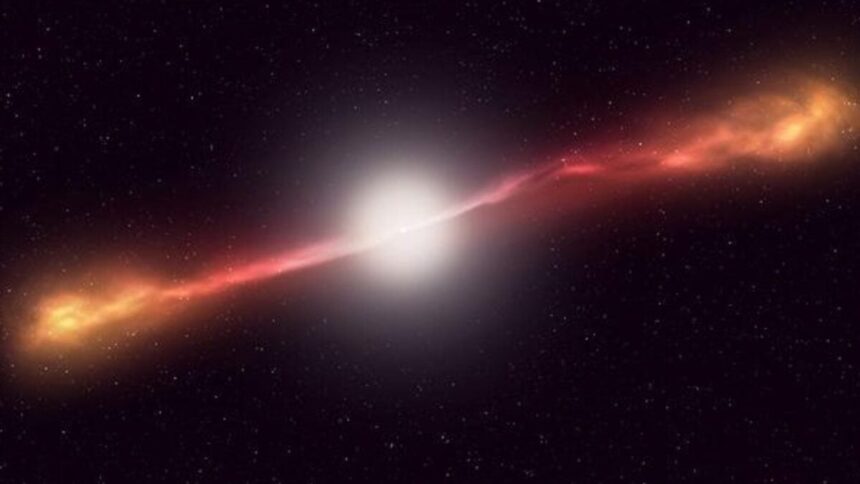A new study from Johns Hopkins University suggests that supermassive black holes—those cosmic behemoths lurking at the centers of galaxies—might already be generating the kinds of high-energy particle collisions researchers have spent decades trying to recreate here on Earth.
Published today in Physical Review Letters, the study proposes that certain spinning black holes could serve as natural particle accelerators, rivaling or even exceeding the capabilities of the Large Hadron Collider (LHC). That’s a big deal, especially as funding for fundamental physics research grows increasingly scarce in the United States, and plans for next-generation colliders stretch far into the future.
For about a decade, experts have theorized that supermassive black holes could do this, co-author Andrew Mummery, a theoretical physicist at the University of Oxford, told Gizmodo. But his study attempted to validate this theory by looking for naturally-occurring scenarios that would give rise to a black hole’s supercollider-like behavior. Understanding how this happens could provide a new avenue for research on dark matter and other elusive particles.
“One of the great hopes for particle colliders like the Large Hadron Collider is that it will generate dark matter particles, but we haven’t seen any evidence yet,” explained co-author Joseph Silk, an astrophysicist at Johns Hopkins University, the University of Oxford, and the Institute of Astrophysics in Paris, in a Johns Hopkins release. “That’s why there are discussions underway to build a much more powerful version, a next-generation supercollider,” Silk said. “But as we invest $30 billion and wait 40 years to build this supercollider—nature may provide a glimpse of the future in super massive black holes.”
At the LHC, protons are smashed together at near-light speeds to uncover the building blocks of reality—and hopefully, to catch a glimpse of dark matter, the mysterious stuff that makes up about 85% of the universe’s mass. But it turns out black holes might already be producing these elusive particles in the wild.
Some supermassive black holes spin so rapidly that they can fling out jets of plasma at astonishing speeds. In their new study, Mummery and Silk modeled what happens near the edge of these spinning monsters, where violent gas flows can whip particles into chaotic collisions, much like a human-built collider does.
“Some particles from these collisions go down the throat of the hole and disappear forever,” Silk said, “But because of their energy and momentum, some also come out, and it’s those that come out which are accelerated to unprecedentedly high energies.”
These ultra-energetic particles zipping through space could, in theory, be picked up by Earth-based observatories like IceCube in Antarctica or the KM3NeT telescope beneath the Mediterranean Sea, both of which already detect ghostly particles called neutrinos. Earlier this year, KM3NeT researchers announced the detection of the most energetic neutrino yet, a potential step forward in understanding the behavior of these ephemeral and energetic particles.
Equipped with a deeper understanding of how these high-energy particles might form at the edges of supermassive black holes, Mummery now aims to investigate their nature. Figuring out what, exactly, escapes from these cosmic voids could offer a cost-effective, naturally occurring complement to traditional colliders. The approach could yield a new path toward uncovering the nature of dark matter.
Read the full article here











